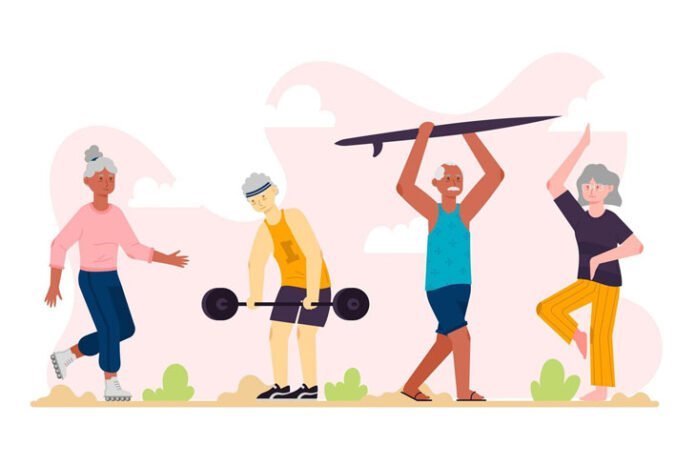For elders to improve their quality of life, they must continue to lead an active and healthy lifestyle. As we age, it becomes increasingly important to focus on physical activity, nutrition, mental well-being, and social connections. These elements are all key to keeping our bodies and minds in their best possible shape. For some elderly individuals, specialized services like memory care, FL might become necessary, but there are many proactive steps seniors can take to maintain their well-being independently.
This article delves into various strategies that help seniors stay healthy and active, offering practical advice and tips to enrich their daily lives. These approaches foster physical health and promote mental positivity and social interactions, which are vital for a fulfilling life. By following a holistic approach, seniors can enjoy their golden years with vitality and joy.
Importance of Physical Activity
Engaging in regular physical activity is vital for seniors. Exercise helps improve cardiovascular health, strengthens muscles, and boosts mental health. Activities such as walking, tai chi, and yoga are excellent choices for those looking for gentle exercise options. It is impossible to exaggerate how vital it is to maintain an active lifestyle because regular exercise extends life and improves the quality of life.
Benefits of Exercise
Physical activity improves balance, reduces the risk of falls, and can alleviate symptoms of chronic conditions such as arthritis and diabetes. Moreover, regular physical activity releases endorphins, which are organic mood enhancers that help older folks feel less depressed and anxious. Studies have shown active seniors are generally happier and more engaged in their communities, further enhancing their overall well-being.
Types of Activities
- Walking: A simple yet effective way to remain active. Walking 30 minutes a day can have significant health benefits.
- Yoga: Enhances flexibility, balance, and mental clarity. Yoga also helps reduce stress and anxiety, making it a well-rounded exercise.
- Strength Training: Helps maintain muscle mass and bone density. Activities like lifting light weights or using resistance bands are beneficial.
Balanced Nutrition
Maintaining good health in older folks requires eating a balanced diet. Seniors who consume a diet rich in fruits, vegetables, lean proteins, and whole grains can be certain they are getting the nutrients they require. Staying hydrated and moderating sugar and salt intake are equally important. Detailed guidelines for balanced diets can be found here. Proper nutrition not only supports physical health but also enhances cognitive functions and emotional stability.
Key Nutrients
It is important to incorporate key nutrients such as calcium, vitamin D, fiber, and protein into daily meals. These nutrients support bone health, digestive health, and overall muscle function. For example, osteoporosis is a prevalent condition among elderly persons that can be prevented with the use of calcium and vitamin D. Protein is required for energy production and muscle repair, while fiber facilitates digestion and helps avoid constipation.
Mental Well-Being
It’s important to maintain mental health in addition to physical wellness. Maintaining cognitive function can be aided by engaging in mentally stimulating activities such as reading, puzzle solving, learning new skills, and more. Mindfulness practices like meditation can also reduce stress and improve overall well-being. Maintaining a positive mindset and pursuing activities that bring joy and fulfillment is important.
Cognitive Stimulation
Activities like solving puzzles, playing musical instruments, and taking up new hobbies can help keep the brain active. Cognitive training can delay the onset of dementia and other neurological illnesses. Engaging in continuous learning keeps the mind agile, and activities like online courses or local workshops can provide new challenges and interests.
Meditation and Mindfulness
Activities that improve mental health include deep breathing, mindfulness, and meditation. These techniques also assist in lowering stress and anxiety. Particularly helpful methods include gradual muscular relaxation and guided imagery. These practices not only calm the mind but also have positive effects on physical health by lowering blood pressure and improving heart health.
Regular Health Check-Ups
Frequent visits to healthcare providers are essential for early detection and management of health issues. Regular check-ups can help monitor chronic conditions, ensuring they are managed effectively. For older adults, this can significantly improve their quality of life. Preventative care measures, such as screenings and vaccinations, are also critical in maintaining health.
Preventative Care
Serious health problems can be avoided with routine screenings and preventive care, such as blood pressure checks and vaccines. Seniors should maintain an open dialogue with their healthcare providers and stay informed about necessary health screenings. Preventative care can catch potential problems early, making them easier to treat and manage. This proactive approach can lead to longer, healthier lives.
Safety Tips for Seniors
Preventing accidents and ensuring safety are critical for an active lifestyle. Simple modifications in the home, such as installing grab bars in bathrooms, ensuring proper lighting, and wearing non-slip footwear, can reduce the risk of falls. It’s beneficial to routinely check the home environment for potential hazards. Moving into a memory care community can be beneficial in maintaining a safe and active lifestyle. Facilities often consist of fitness classes, specialized equipment and safe walking paths. Seniors can live more confidently when they take safety precautions, which can drastically lower the risk of injury.
Home Modifications
- Install grab bars in bathrooms: Provides support and reduces the risk of falls.
- Ensure proper lighting in all areas: Prevents trips and falls by improving visibility.
- Use non-slip mats and footwear: Reduces the risk of slipping on wet or polished floors.
In conclusion, maintaining an active and healthy lifestyle is essential for seniors to enjoy their golden years with vitality and fulfillment. Regular physical activity, balanced nutrition, and mental well-being practices play a crucial role in enhancing overall health and happiness. Seniors can also benefit from preventative healthcare, safety precautions, and creating a supportive living environment. By embracing these strategies, elderly individuals can lead fulfilling lives, staying physically active, mentally sharp, and socially connected for years to come.
